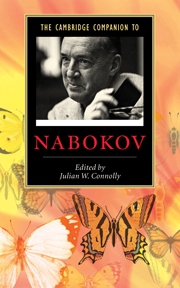2 - Nabokov as storyteller
from Part I - Contexts
Published online by Cambridge University Press: 28 May 2006
Summary
In the quarter century since his death, much has been made of Nabokov as a thinker, as a metaphysician and moralist. We have learned a great deal, but D. Barton Johnson has recently challenged readers of Nabokov by asking, wouldn't we still be fascinated by his work even without his ideas? Although Nabokov would write differently in all sorts of ways if his metaphysics and ethics were thinner and poorer, Johnson surely is right, we would still read Nabokov without them.
Why would we? The obvious first answer is style. Nabokov is widely and justly regarded as a high-water mark of literary style. But although we admire the style of Speak, Memory, or Nabokov’s forewords and afterwords, or even Strong Opinions, we would not be drawn back to Nabokov again and again if there were just style and no story in his work. The dazzling detail, the inventive imagery, the patterned prose, the sinuous sentences, the thrill of the thought are all very well – very, very well – but even they are not enough.
- Type
- Chapter
- Information
- The Cambridge Companion to Nabokov , pp. 31 - 48Publisher: Cambridge University PressPrint publication year: 2005



